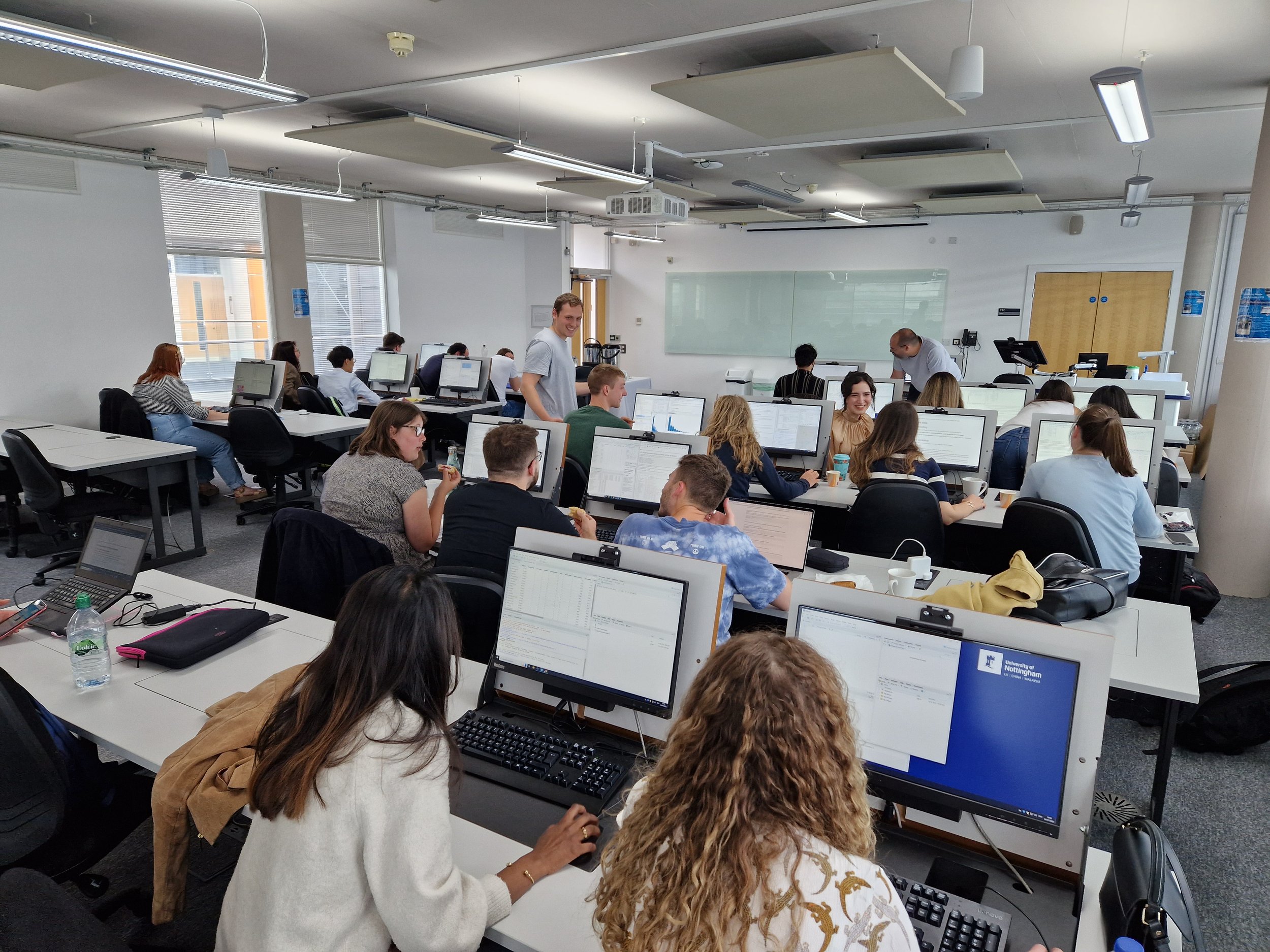
Training Programme
The CDT has a comprehensive training programme that complements PhD research. The training elements comprise six Training Hubs (spread over the four years of the course), two mini-projects (one in industry and one in academia) and a series of colloquia and workshops
Training Hubs:
Each Training Hub runs for 1 week (with the exception of Training Hub 1, which runs over 2 weeks). They are designed to teach soft skills, research skills and foundational pharmaceutical knowledge.
The two key themes for foundational knowledge are
the medicines development pathway and
computational skills.
As students progress through the Hubs they will learn the major milestones on the route to bringing a medicine to market and the key computational skills required to be a leader in the pharmaceutical industry. To reinforce learning, each Hub ends with a longitudinal challenge project, which students work on between Hubs. After completion of Training Hubs 1-3 students should have sufficient skills to apply for Registered Scientist (RSci) status with either the Royal Society of Chemistry, the Royal Society of Biology or the Institute of Physics.
Mini-projects:
Each student will undertake two 12-week mini-projects, one in academia and one with an industry partner. Students will select a project from a list of options and will join the respective academic group/company partner for the duration of their project. For each mini-project students will submit short reports, which will be examined at a short (50 minutes) viva-voce examination at the end of year 1.
Colloquia:
Twice a year, all CDT students attend the colloquium (academic conference) series. At each event, a number of students present their current research. Presentations can be either oral or poster, ensuring that students gain experience in both main types of scientific presentation by the end of their PhD
PhD Programme
The CDT programme is primarily designed as a full-time commitment. However, applicants have the option to enrol part-time.
Our programme is designed to provide you with a broad training experience. During the initial training period in Year 1, you will have the opportunity to meet and work with various faculty members. This approach allows you to explore different research areas and make an informed choice about your supervisor. Our programme does not have a fixed list of projects at the application stage. Instead, projects are developed in collaboration with our students, academic supervisors, industrial and clinical partners and are tailored to the interests and skills of our students. This flexible approach ensures that your research is both innovative and relevant.
Students enrolled in the full-time mode of study will engage in their programme at 1.0 FTE (equivalent to 5 days per week on average).
Key Points:
Duration: Full-time PhDs are typically completed within 4 years.
Training Hubs: Students will undertake three training hubs in their first year of study, and one further hub in each subsequent year of the PhD.
Mini Projects: One university-based training project will take place in October-December of the first year of study, followed by an industry-based training project in February-April.
Structured Schedule: PhD projects will be generated in a collaborative environment, and research will begin in May of the first year of study.
Students enrolled in the part-time mode of study will engage in their programme at anything from 0.5 to 0.9 FTE (equivalent to 2.5 to 4.5 days per week on average). This flexibility allows for a range of pathways, and we will collaborate with part-time students to devise a suitable programme for them. Part-time students will engage in all the same activities as full-time students, but spread over a longer period (up to 8 years for 0.5 FTE).
Key Points:
Duration: Part-time PhDs can be completed over 5-8 years.
Training Hubs: Attendance at training hubs is required full-time, meaning up to three weeks of full-time attendance per year.
Mini Projects: Both university and industry projects will be undertaken on a part-time basis with clear timelines.
Bespoke Arrangements: Applicants considering part-time studies are welcome to contact us to discuss potential schedules.
-

Computational Skills
Statistics
Design of Experiments
Computational Thinking
Data Management & Database Structure
AI in Industry
Ethical issues with AI
ML Methods
Revision Workshops on SQL Database
Working with Real Data
Big Data
-

Longitudinal Challenges
SQL Database Structure
ML Learning Algorithm Challenge / Python Programming
Teamwork Leadership
-

Sustainability
Sustainability will be considered throughout the PhD.
This will in part be through a consideration of sustainability in practice using the Laboratory Efficiency Assessment Framework (LEAF).
LEAF is a standard set by UCL to improve the sustainability and efficiency of laboratories https://www.ucl.ac.uk/sustainable/take-action/staff-action/leaf-laboratory-efficiency-assessment-framework.
Laboratories are awarded either a Bronze, Silver, or Gold level depending on how many sustainability actions they take.
All laboratory based students in the CDT must carry out their PhD research in at least bronze-rated LEAF labs. Non-LEAF-rated labs should seek LEAF ratings during the first year of a student’s PhD research, led by the student and supported by the supervisors.
Students will in addition attend sustainability seminars aligned to their research and engage with ‘Sustainability in industry’, during industrial placements to ensure the spread of best practice.



